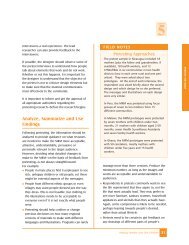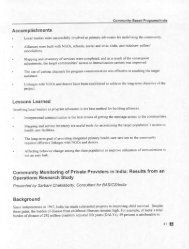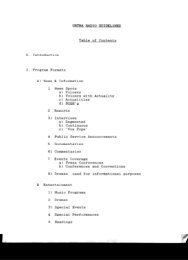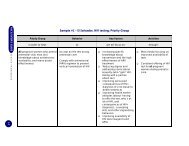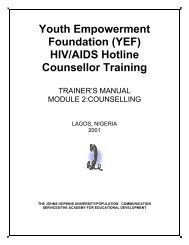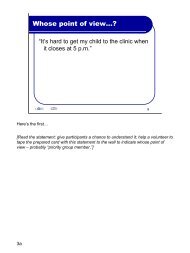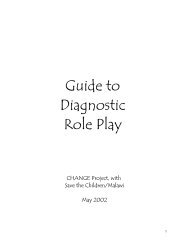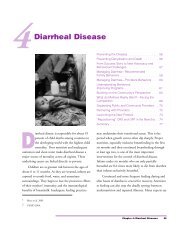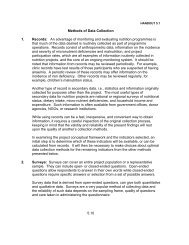MODULE TWO: COUNSELLING - FHI 360 Center for Global Health ...
MODULE TWO: COUNSELLING - FHI 360 Center for Global Health ...
MODULE TWO: COUNSELLING - FHI 360 Center for Global Health ...
Create successful ePaper yourself
Turn your PDF publications into a flip-book with our unique Google optimized e-Paper software.
they feel frustrated with the conversation or are very upset by in<strong>for</strong>mation that a<br />
counsellor has given them. Some callers may also place “hoax” calls just to be<br />
malicious. If this happens, one strategy is <strong>for</strong> the counsellor to acknowledge the<br />
feelings behind the caller’s language and state that such behaviour will prevent<br />
you from helping him/her. (Ex: “It seems like you are very angry about your<br />
positive HIV diagnosis. Many people have this reaction. I am not able to help<br />
you until you calm down, however.”). If this does not work, or if the caller is<br />
extremely verbally abusive, then the counsellor should terminate the call in a<br />
polite way. (Ex: I can tell that you are angry, but I am afraid that I will have to<br />
end this call if you are not able to calm down. Good bye.”<br />
♦PROBLEM: A client calls back repeatedly <strong>for</strong> one particular<br />
counsellor. Callers may repeatedly call a particular counsellor if they like<br />
him/her and feel com<strong>for</strong>table with him/her. While this is a sign that the<br />
counsellor is doing a good job, it can also encourage the caller to become overly<br />
dependent on the hotline. It is important to remember that the YEF HIV/AIDS<br />
Hotline cannot provide psychological counselling <strong>for</strong> serious problems, and that<br />
the main function is to provide AIDS in<strong>for</strong>mation and counselling. Counsellors<br />
who receive repeat calls from a client should clearly state YEF HIV/AIDS Hotline’s<br />
limitations and should refer the caller to services that can better meet their<br />
needs.<br />
♦PROBLEM: A caller expects a service that the YEF HIV/AIDS Hotline<br />
cannot provide. Callers may misunderstand the role of the YEF HIV/AIDS<br />
Hotline and may call to demand services that cannot be provided. For example,<br />
a caller may call to report that his/her neighbour has AIDS, and demand that the<br />
YEF HIV/AIDS Hotline in<strong>for</strong>m the proper authorities. Or a caller may expect to<br />
be able to have a face-to-face meeting with a counsellor. Whatever the case,<br />
the counsellor should clearly state the services that the YEF HIV/AIDS Hotline is<br />
able to provide, and s/he should refer the caller to other services that can better<br />
meet his/her needs.<br />
<strong>COUNSELLING</strong> RULES<br />
Following is a list of telephone hotline counselling rules which can help<br />
counsellors to avoid and deal with difficult situations. The main idea each rule<br />
(in bold) should be written on flipchart paper as they are read out by<br />
participants. Keep them posted on the wall <strong>for</strong> the remainder of the training, in<br />
order to rein<strong>for</strong>ce the messages.<br />
Session 7- Pg. 4



